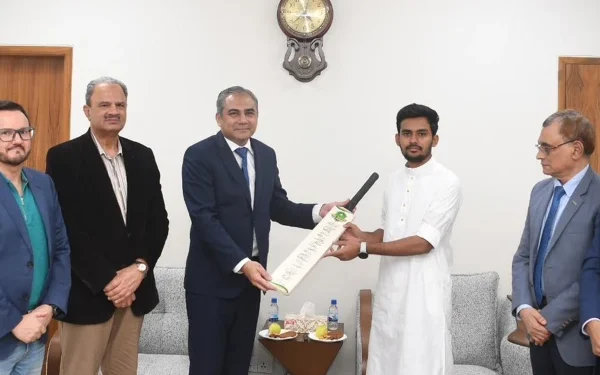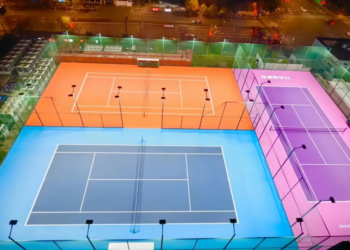Introduction: A New Chapter in Regional Cooperation
In a significant move aimed at deepening bilateral relations between Pakistan and Bangladesh, Federal Interior Minister and Pakistan Cricket Board (PCB) Chairman Mohsin Naqvi held a high-level meeting with Bangladesh’s Minister for Sports, Youth Affairs, Local Government, and Rural Development, Asif Mahmood. The meeting focused on strengthening cooperation in sports, youth development, education, technological innovation, and renewable energy.
Both sides expressed their commitment to working together for the betterment of their countries, especially through initiatives involving the youth. Among the key outcomes of the meeting were plans to enhance cricket collaboration, initiate umpiring development programs, support women’s cricket, and launch mutual youth empowerment projects.
This diplomatic engagement serves as a timely reminder of how sports diplomacy can be leveraged to bridge regional divides and promote shared growth.
Cricket at the Core of Bilateral Engagement
Cricket, a unifying sport across South Asia, was the central focus of the discussions. Pakistan and Bangladesh, both passionate cricketing nations, see sports—particularly cricket—not only as a form of national pride but also as a tool for social development, diplomacy, and youth engagement.
During the meeting, Mohsin Naqvi extended an invitation to Bangladeshi cricket umpires to receive professional training in Pakistan. This gesture reflects PCB’s intent to build technical capacity among officials in the region and to foster goodwill between the two cricket boards.
The proposal also includes the possibility of joint umpiring workshops, seminars, and exchange programs, which would elevate the standards of officiating in both countries.
Empowering Women’s Cricket Across Borders
A key highlight of the talks was the discussion around enhancing women’s cricket development programs. Both Pakistan and Bangladesh have made considerable progress in women’s cricket in recent years, but there remains a long way to go in terms of infrastructure, coaching, funding, and visibility.
By agreeing to cooperate on women’s cricket, the two countries aim to offer greater opportunities to young female athletes, increase participation at the grassroots level, and promote bilateral women’s cricket tours.
Initiatives under discussion include:
- Joint training camps
- Coaching and fitness clinics
- Technical exchange programs for women’s cricket coaches
- Scheduling more women’s cricket series between the two nations
A Formal Agreement on the Horizon
In a landmark step toward long-term collaboration, it was agreed that the Pakistan Cricket Board (PCB) and the Bangladesh Cricket Board (BCB) will soon sign a formal Memorandum of Understanding (MoU). This agreement will outline clear terms of cooperation not only for cricket development but also for related youth programs and sports science collaborations.
This MoU will institutionalize the partnership between the two boards, ensuring continuity, resource sharing, and strategic alignment on issues critical to regional cricket development.
Youth Development and Employment: A Shared Vision
With a large percentage of the population in both Pakistan and Bangladesh comprising young people, the ministers emphasized the urgent need for youth-focused policies and initiatives. Recognizing the potential of the younger generation as the cornerstone of national progress, both sides discussed launching joint youth development and employment programs.
The focus areas include:
- Vocational training programs
- Entrepreneurship and startup incubators
- Internship and apprenticeship opportunities across industries
- Youth exchange programs and leadership forums
Mohsin Naqvi noted that sports, particularly cricket, can serve as an entry point for engaging youth, helping to instill discipline, leadership, teamwork, and national pride.
Strengthening Educational Ties and Scholarship Programs
Education emerged as another key area of mutual interest. Both nations acknowledged the need to enhance cooperation in higher education, research, and scholarship exchanges.
Pakistan and Bangladesh already have numerous universities that attract international students. By developing frameworks for academic partnerships and joint research, both countries aim to:
- Facilitate student exchange programs
- Create dual-degree programs
- Launch joint conferences and symposiums
- Provide mutual recognition of academic credentials
The goal is to create pathways for students and researchers to benefit from academic ecosystems across borders, especially in fields like science, sports management, public health, and technology.
Innovating Together: Solar Energy and Technological Collaboration
In a forward-looking discussion, the two leaders exchanged ideas on increasing cooperation in renewable energy, particularly solar power generation. Given the climate challenges both countries face, and their dependence on imported energy, this is a critical area for mutual benefit.
Areas of collaboration in renewable energy may include:
- Joint pilot solar projects in rural areas
- Sharing of technical know-how and solar technologies
- Workshops and training on solar panel installation and maintenance
- Public-private partnerships in green energy
The emphasis on innovation wasn’t limited to energy. Both parties also discussed advancing digital governance and public service technologies.
NADRA: A Model for Digital Identity Systems
Interior Minister Mohsin Naqvi introduced Pakistan’s National Database and Registration Authority (NADRA) as a model of secure and foolproof identity documentation. NADRA is internationally recognized for its advanced biometric systems, fraud prevention mechanisms, and efficient digital services.
Bangladeshi Minister Asif Mahmood expressed deep interest in learning more about NADRA’s infrastructure and capabilities. In response, Mohsin Naqvi formally invited a high-level Bangladeshi delegation to visit NADRA’s headquarters in Islamabad.
Such collaboration could potentially help Bangladesh enhance its digital citizen identity systems, e-governance tools, and cybersecurity measures.
Building People-to-People Relations
The meeting underlined the need for people-to-people diplomacy, beyond political frameworks. Through sports, education, and shared youth initiatives, Pakistan and Bangladesh can build lasting cultural ties.
Both nations have a rich shared history, cultural affinities, and common challenges. By investing in collaborative efforts that prioritize the needs of their populations, especially the youth, the two countries can build a stronger, more integrated South Asia.
High-Level Attendance Signifies Strategic Importance
The presence of senior officials from both countries underscored the importance of this engagement. Notable attendees included:
- Mehboob Alam, Secretary of the Ministry of Sports and Youth, Bangladesh
- Raza Al-Maqsood, Secretary of Local Government, Bangladesh
- Muhammad Wasif, Charge d’Affaires of the Pakistani High Commission
- Mike Hesson, Head Coach of the Pakistani national cricket team
- Naveed Akram Cheema, Team Manager
- Other senior officers from the Ministries of Sports, Education, and Interior
Their presence highlights the inter-ministerial coordination and seriousness behind these proposals.
Conclusion: A Promising Future of Regional Collaboration
The meeting between Mohsin Naqvi and Asif Mahmood is a milestone in Pakistan-Bangladesh relations, signaling a move toward pragmatic, people-centered diplomacy. With cricket as the catalyst, both countries have agreed to embark on multi-sectoral cooperation that includes sports, youth employment, education, digital governance, and renewable energy.
These initiatives are expected to bear fruit in the coming months, especially once the formal agreements are signed. As Pakistan and Bangladesh work together to harness their shared strengths, this partnership could become a regional model for cooperation through sports and development.

























